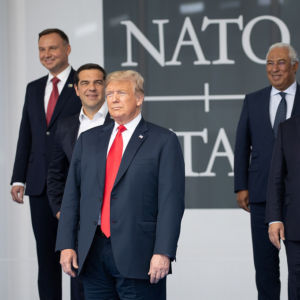Editor’s Note: For an alternative point of view, please see: Point: Does NATO Still Matter? No!
From the bluster at the NATO summit in Brussels, through his attack on the United Kingdom’s Prime Minister Theresa May, to his deference to Russia’s Vladimir Putin at the joint news conference in Helsinki, President Trump’s trip to Europe marked a new low for trans-Atlantic relations. Perhaps the president does not wish to destroy the alliance — but it is not clear that he would behave any differently if he did.
The Helsinki summit was emblematic of the president’s longstanding relativization of differences between democracies and America’s authoritarian adversaries. From askingwhether “our country’s so innocent” in a response to a question about extrajudicial killings of journalists in Russia, through calling Putin “fine” and Kim Jong Un “very talented,” to blaming the poor state of U.S.-Russian relations on America’s “foolishness and stupidity,” such rhetoric is dangerous. Until recently, NATO was construed as an alliance based on democratic values. That perception is at risk if Trump holds such values in contempt.
One of NATO’s members, Turkey, has already turned into a full-fledged autocracy. Another two — Hungary and Poland — are moving fast in an authoritarian direction. That is not a new problem for the alliance, as anyone who remembers Antonio Salazar’s dictatorship in Portugal and the regime of the colonels in Greece can attest. However, at a time when the Western world is not facing only one single and easily identifiable enemy, like the Soviet Union, the lack of common values within the alliance will make it impossible to agree on a shared strategic view of the world.
In its frequent criticisms of Ukraine, for example, Hungary’s government often sides with Russia, much to the dismay of other members of the alliance.
Trump is on more solid ground when he points out Europe’s failure to “pay its fair share” within NATO. Of course, the 2 percent are not being “paid” into a common budget, as the president seems to suggest. Instead, they represent a target for national defense spending that the allies committed to reach at the alliance’s summit in Wales in 2014.
If there is a gap between such aspirations and reality, the president’s remedies for the problem of “free riding” might prove worse than the disease. Specifically, Trump does not hide his disdain for the European Union, supposedly a “foe” of the United States. But in the absence of a strong EU, simple increases in military spending by European countries are bound to revive dangerous national rivalries that defined much of the continent’s history.
Imagine a Germany that is effectively remilitarized. How would the Czechs and Poles react, who lived under Nazi occupation and who are already complaining about Germany’s hegemony in Europe? And how about Greeks who blame Germany for the severity of their economic problems?
If the idea of an interstate conflict in Europe seems farfetched, it is only because of U.S. military domination of the continent for the last 70 years. Europe’s “freeloading” established the United States as an uncontested hegemon of the West, made European nation-states harmless, and helped rebuild Europe in America’s image — also through the EU.
If, today, the United States does not want to carry the burden of global leadership, or to do so alone, its best bet is to promote not Europe’s disintegration but rather help build a strong and autonomous European pillar of NATO, embedded in a reformed EU, which will feature a coherent foreign policy and wield real power on the world stage.
There is a long way to go. The structures underpinning a common EU foreign and security policy are vestigial, plagued by the EU’s perennial problem of reaching agreements in the form of the lowest common denominator.
But even if Trump does not derail the European project, it is already fueling anti-Americanism and risks pitting a united Europe, when it emerges, against the United States.
Poland’s former Foreign Minister Radek Sikorski, one of his country’s most distinguished Atlanticists, asked on Twitter on Monday whether Polish right-wing admirers of Trump “would like it — if it came to that — to see him defend Poland in the same was as he defended America’s institutions and interests.”
Unless Trump changes course quickly, not only will NATO not adapt to the realities of the 21st century by strengthening its European pillar, it will become irrelevant. Such an outcome would be a tragedy for the world, especially for the United States — its deep bonds of friendship with likeminded allies around the world, after all, have no appealing alternative. And, as Oscar Wilde would have put it, there is only one thing worse than having to deal with allies (“freeloading” or not) — and that is not having any.

